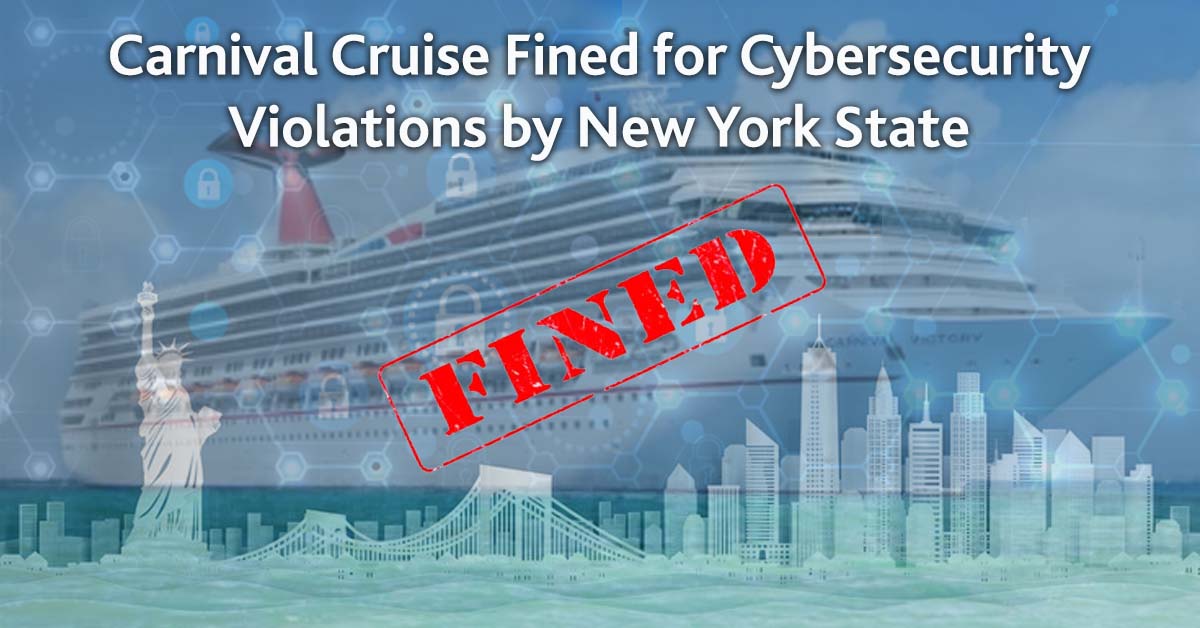By
OCD Tech
July 11, 2022
•
9
min read

Some companies transgressions can be seen as a guide of “what not to do” in terms of cybersecurity compliance: repeated violations, insufficient controls, multiple breaches yet no lessons learned, the list goes on. Carnival Cruise Line may be one of those companies. Carnival Cruise Line was fined $5 million on June 24th, 2022, for “significant” cybersecurity violations following four security breaches from 2019 to 2021, that exposed a large amount of sensitive customer data [1]. The investigation by New York State found that the company failed to implement several mandatory safeguards required under New York law. Furthermore, the cruise line allegedly repeatedly recertified compliance with New York’s Department of Financial Services (NYDFS) Cybersecurity Regulation even though they were not compliant. But let’s back up first and figure out how we got here.
New York’s Department of Financial Services enacted the NYDFS Cybersecurity Regulation (also known as 23 NYCRR 500) in 2017 to impose strict requirements for financial institutions to safeguard customer’s personal information. The law applies to all entities operating under or required to operate under the DFS licensure, registration or charter or are regulated by the DFS as well as covered entities including:
The Regulation includes a list of requirements to safeguard information including creating a cybersecurity program, appointing a Chief Information Security Officer (CISO), implementing multi-factor authentication (MFA), conducting risk assessments, penetration tests and vulnerability assessments, among others.
Carnival Cruise Line was a licensed insurance producer in New York state and sold various insurance products, therefore was subject to DFS’s Cybersecurity Regulation law. The company failed to maintain certain safeguards required under 23 NYCRR 500 including:
As a result, their cybersecurity compliance certifications for the Cybersecurity Regulations law were improper. Besides the $5 million dollar fine, they also agreed to surrender their insurance provider licenses. They are not allowed to sell insurance in the state of New York until further notice. Carnival Cruise Line also recently settled a lawsuit brought by 45 state attorneys general and the District of Columbia for $1.25 million due to the first data breach in 2019[2]. The DFS Superintendent, Adrienne Harris who oversaw the investigation explained the importance of protecting personal information: “A data breach exposing personal data allows bad actors to, among other things, commit identity theft, which can have significant repercussions on an individual’s financial health. DFS will continue diligently enforcing its first-in-the-nation Cybersecurity Regulation to ensure that consumers’ personal, non-public, and sensitive data are protected.”[3] Companies should ensure they are fully compliant with applicable laws, or they could find themselves in a similar situation.
Review a copy of the consent order.
Also, it is worth noting that non-banking institutions, such as mortgage lenders, motor vehicle dealers, and payday lenders are now subject to compliance under the FTC Safeguards Rule. Under this rule, these institutions must develop, implement, and maintain a comprehensive security system to keep their customers’ information safe. The deadline for compliance is looming and failure to comply can result in restrictions and penalties by the FTC.
[3] https://www.dfs.ny.gov/reports_and_publications/press_releases/pr202206241

Audit. Security. Assurance.
IT Audit | Cybersecurity | IT Assurance | IT Security Consultants – OCD Tech is a technology consulting firm serving the IT security and consulting needs of businesses in Boston (MA), Braintree (MA) and across New England. We primarily serve Fortune 500 companies including auto dealers, financial institutions, higher education, government contractors, and not-for-profit organizations with SOC 2 reporting, CMMC readiness, IT Security Audits, Penetration Testing and Vulnerability Assessments. We also provide dark web monitoring, DFARS compliance, and IT general controls review.
Contact Info
.svg)
OCD Tech
.svg)
25 BHOP, Suite 407, Braintree MA, 02184
.svg)
844-623-8324
.svg)
https://ocd-tech.com
Follow Us
Videos
Check Out the Latest Videos From OCD Tech!
Services
SOC Reporting Services
– SOC 2 ® Readiness Assessment
– SOC 2 ®
– SOC 3 ®
– SOC for Cybersecurity ®
IT Advisory Services
– IT Vulnerability Assessment
– Penetration Testing
– Privileged Access Management
– Social Engineering
– WISP
– General IT Controls Review
IT Government Compliance Services
– CMMC
– DFARS Compliance
– FTC Safeguards vCISO